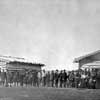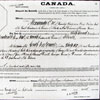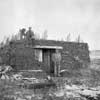1901-1914

 The last few years of the 19th century and the first decade of the 20th century marked the arrival of Alberta's first Estonian pioneer families. The era was characterized by the Government of Canada's desire to populate the West. And with Alberta's subsequent membership into the Canadian Federation, Alberta officially became a province in 1905. With acres and acres from which to choose, Alberta's Estonian families sought land that reminded them of their birthplace. Moreover, they were seeking workable, spacious, and profitable farmland that could serve the needs of their expanding network of friends and relatives.
The last few years of the 19th century and the first decade of the 20th century marked the arrival of Alberta's first Estonian pioneer families. The era was characterized by the Government of Canada's desire to populate the West. And with Alberta's subsequent membership into the Canadian Federation, Alberta officially became a province in 1905. With acres and acres from which to choose, Alberta's Estonian families sought land that reminded them of their birthplace. Moreover, they were seeking workable, spacious, and profitable farmland that could serve the needs of their expanding network of friends and relatives.
 For the Estonians, this era marked a new beginning in unfamiliar territory. However, Estonian settlers were optimistic about their new opportunity as they were no longer subject to Russian and German oppression. traditions and cultures With the passing of the Dominion Lands Act in 1872, Estonians could afford to settle and expand in the vast prairie fields of the Canadian west.
For the Estonians, this era marked a new beginning in unfamiliar territory. However, Estonian settlers were optimistic about their new opportunity as they were no longer subject to Russian and German oppression. traditions and cultures With the passing of the Dominion Lands Act in 1872, Estonians could afford to settle and expand in the vast prairie fields of the Canadian west.








